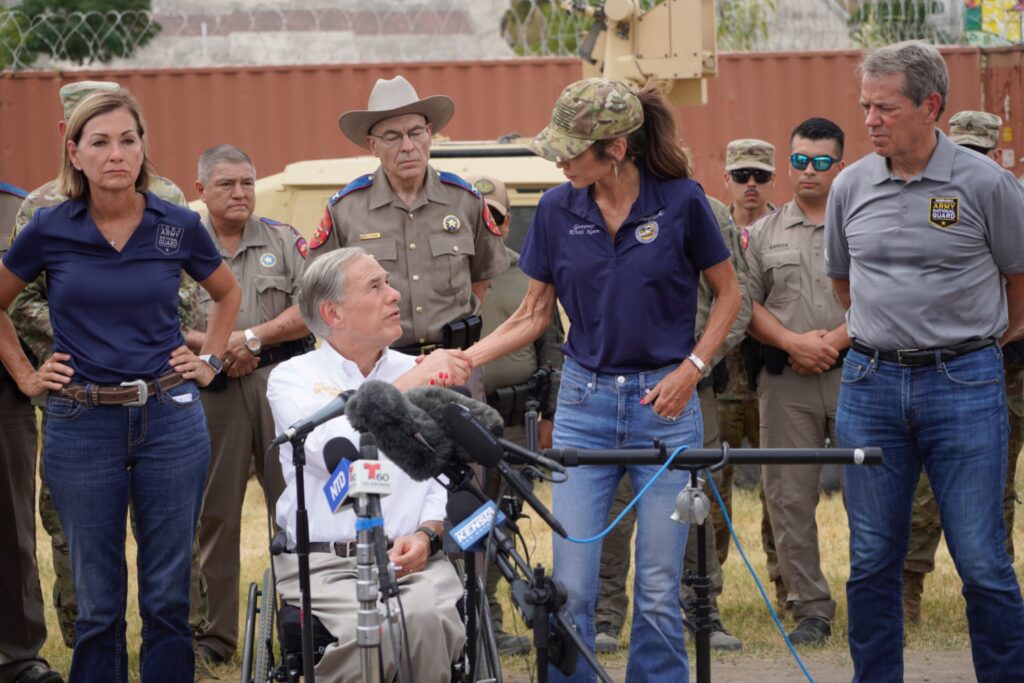
Joshua Haiar and Seth Tupper, South Dakota Searchlight – Texas has not repaid South Dakota for assistance at the Texas-Mexico border even though similar mutual-aid agreements between South Dakota and other states have typically involved reimbursement, according to legislators and state officials.
That revelation came Tuesday, one day before Governor Kristi Noem was scheduled to address a joint session of the Legislature about what she foreshadowed as a “potential South Dakota response” to problems at the border.
Noem approved South Dakota National Guard troop deployments to the border twice in 2021 and once last year. One of the deployments was federally requested, and the troops were on federal pay status. Noem ordered the others, resulting in costs of at least $1.3 million that she paid from South Dakota’s Emergency and Disaster Fund. Another $1 million came from a private donor.
Tuesday, the Legislature’s budget committee heard testimony at the Capitol in Pierre on a new bill to replenish the Emergency and Disaster Fund.
Rep. Linda Duba, D-Sioux Falls, noted that language in past bills said the fund is to be used for expenses “in South Dakota.” Duba asked a Noem administration official why the language in this year’s funding bill has been changed to cover emergencies and disasters “impacting this state.”
Kristi Turman, of the state Department of Public Safety, said the proposed language would cover requests for assistance from other states through the Emergency Management Assistance Compact, known by the acronym EMAC. The compact is a nationwide mutual aid agreement among states.
“We wanted to make sure our language was encompassing those expenses,” Turman said. “We don’t think it had in the past.”
Turman added, “All of our EMAC missions have been reimbursed by the states that have requested our assistance, except for the state of Texas.”
Legislators on the committee did not press Turman further about whether South Dakota’s border-related assistance to Texas was provided with or without an expectation of repayment. The committee postponed action on the funding bill.
Afterward, committee member Sen. Ryan Maher, R-Isabel, told South Dakota Searchlight he has not seen the EMAC agreement with Texas but has seen documentation related to it, and the documentation contained no evidence of a reimbursement plan.
“Texas is the only state where we are doing that,” Maher said.
South Dakota Searchlight asked the state Department of Public Safety and Noem spokesman Ian Fury several questions about the arrangement with Texas, and also asked for a copy of the agreement. Instead of answering, the department and Fury both directed Searchlight to the state’s formal public records request portal. Searchlight made a request for a copy of the agreement, and that request is pending.
Noem has stepped up her rhetoric about the border in recent days and has repeatedly labeled it a “warzone.” She visited the border last year and again on Friday, but her office has not responded to South Dakota Searchlight questions about how she got there, who paid, or the cost.
Last year’s deployment of 50 South Dakota National Guard troops cost $850,000 and was funded by the state’s Emergency and Disaster Fund, according to past statements by Noem’s office.
In 2021, Noem accepted a $1 million donation from Tennessee billionaire Willis Johnson to pay most of the cost for deploying 48 South Dakota National Guard troops to the border. That deployment cost a total of $1.45 million, according to records obtained by Citizens for Responsibility and Ethics in Washington through a Freedom of Information Act lawsuit. The $1 million donation was routed through South Dakota’s Emergency and Disaster Fund, and the fund itself covered the portion of the deployment’s cost not covered by the donation.
The border has dominated national politics in recent weeks. The federal Border Patrol made 249,785 arrests for illegal border crossings in December, which was an all-time high since monthly numbers have been released. Meanwhile, Congress has been attempting to negotiate border policy legislation, and the issue has taken center stage in the presidential campaign. Noem is widely considered to be a potential running mate for the leading Republican presidential candidate, former President Donald Trump.
